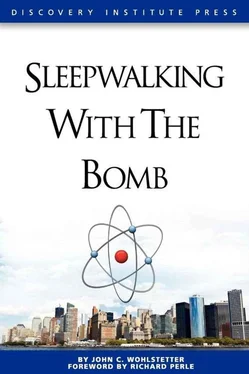John Wohlstetter - Sleepwalking with the Bomb
Здесь есть возможность читать онлайн «John Wohlstetter - Sleepwalking with the Bomb» весь текст электронной книги совершенно бесплатно (целиком полную версию без сокращений). В некоторых случаях можно слушать аудио, скачать через торрент в формате fb2 и присутствует краткое содержание. Город: Seattle, Год выпуска: 2012, ISBN: 2012, Издательство: Discovery Institute Press, Жанр: История, military, Политика, Публицистика, на английском языке. Описание произведения, (предисловие) а так же отзывы посетителей доступны на портале библиотеки ЛибКат.
- Название:Sleepwalking with the Bomb
- Автор:
- Издательство:Discovery Institute Press
- Жанр:
- Год:2012
- Город:Seattle
- ISBN:978-1-93659-906-6
- Рейтинг книги:3 / 5. Голосов: 1
-
Избранное:Добавить в избранное
- Отзывы:
-
Ваша оценка:
- 60
- 1
- 2
- 3
- 4
- 5
Sleepwalking with the Bomb: краткое содержание, описание и аннотация
Предлагаем к чтению аннотацию, описание, краткое содержание или предисловие (зависит от того, что написал сам автор книги «Sleepwalking with the Bomb»). Если вы не нашли необходимую информацию о книге — напишите в комментариях, мы постараемся отыскать её.
RICHARD PERLE, Resident Fellow, American Enterprise Institute and Assistant Secretary of Defense, 1981–1987 Sleepwalking with the Bomb
Sleepwalking with the Bomb — читать онлайн бесплатно полную книгу (весь текст) целиком
Ниже представлен текст книги, разбитый по страницам. Система сохранения места последней прочитанной страницы, позволяет с удобством читать онлайн бесплатно книгу «Sleepwalking with the Bomb», без необходимости каждый раз заново искать на чём Вы остановились. Поставьте закладку, и сможете в любой момент перейти на страницу, на которой закончили чтение.
Интервал:
Закладка:
In his history of the Strategic Air Command, 15 Minutes, L. Douglas Keeney recounts the November 24, 1961 “Black Forest” incident. Upon an alarm signaling that a Soviet first strike was underway, a full-blown Strategic Air Command alert was triggered, with well over 500 bombers and almost 400 tankers sitting on the runway. The alert was cancelled when the alarm signal was traced to a faulty component in a microwave radio tower in Black Forest, Colorado.
The U.S. and USSR had one luxury denied small states: the ability to absorb a small or medium strike and survive, albeit greatly and permanently diminished. Even a small-scale attack can extinguish tiny statelets like those in the Persian Gulf. Unlike the United States, Russia, and other large states, whose huge territories and vast, dispersed populations make only a large-area attack capable of ending national life, a few well-placed nuclear bombs could virtually extinguish the national life of a small country.
Nuclear crises arise suddenly, take novel forms, and impose immense stress on leaders, with little margin for error. With survival at stake, the temptation to strike first could well prove irresistible. Revolutionary powers are more likely than others to take gambles that generate crises. In 1962 the Soviet Union was avowedly revolutionary, seeking world domination. Its deployment of nuclear missiles in Cuba brought the world to the brink of nuclear war. Its demise was essential to end the revolutionary threat posed by Communism. The demise of the revolutionary Islamist regime in Iran, and its replacement by a moderate government, is the only way to defuse the growing confrontation in the Mideast. REVOLUTIONARY POWERS CANNOT BE CONTAINED; THEY MUST BE DEFEATED. If this Third Lesson of nuclear of nuclear-age history is ignored, the consequences could be devastating.
6.
NORTH KOREA: NUCLEAR HOSTAGE TAKING
It was already one in the morning; the rain pattered dismally against the panes, and my candle was nearly burnt out, when, by the glimmer of the half-extinguished light, I saw the dull yellow eye of the creature open.
MARY SHELLEY, FRANKENSTEIN, OR THE MODERN PROMETHEUS , CHAPTER 5 (1818)THE CONTRASTING FATES OF IRAQ, LIBYA, AND NORTH KOREA ILLUSTRATE how nuclear weapons can determine whether a dictatorship survives despite adverse international pressure. Saddam’s nuclear program was not complete in 1991, when the Gulf War coalition moved to eject his forces from Kuwait. Had Saddam been able to threaten Turkey and Saudi Arabia with nuclear attack, neither country would likely have permitted coalition forces to launch military action from its soil.
On the eve of the coalition’s March 2003 invasion of Iraq, Libyan dictator Muammar Qaddafi agreed to surrender his WMD arsenal, including nuclear materials. He feared that after Saddam Hussein’s regime was toppled for failure to comply with UN WMD resolutions, Libya would be next in line. In 2011, with Qaddafi bereft of nuclear materials, NATO and the Arab League were willing to support Libyan rebels, and Qaddafi found himself on history’s ash heap.
This was in stark contrast to the reaction of outside powers when, in 2006, North Korea detonated its first nuclear device. The reaction has been mostly the serial offering of bribes, in what has been the vain hope that Pyongyang would in return surrender its nuclear arsenal. Preventive military options are now off the table.
These cases collectively offer the Fourth Lesson of nuclear-age history: NUCLEAR WEAPONS GIVE NATIONS A “DYING STING” CAPABILITY THAT VIRTUALLY PRECLUDES PREEMPTIVE ACTION AND CONFERS NEAR-TOTAL SURVIVAL INSURANCE.
This lesson applies in particular to dictatorships, which rule by force rather than by consent of the governed. Their nuclear status gives them greater freedom to forcibly suppress dissent, because outsiders are less likely to intervene militarily. Rogue states like North Korea are a little less dangerous than revolutionary states like Iran, because they have more limited strategic objectives. North Korea does not aspire to overthrow the existing world order, as does the Islamic state established by the Ayatollah Khomeini. But rogues still can be very dangerous. Not only does the North foment trouble on the Korean Peninsula and in the northwest Pacific, it has distributed nuclear technology to Iran and Syria. For these reasons the ultimate goal regarding rogue states, as with revolutionary states, is positive regime change that brings in a moderate government capable of peaceful coexistence with other nations.
As this book went to press North Korea had violated its international commitments once again by conducting a satellite launch test using its newest ballistic missile, a three-stage vehicle with intercontinental range and the ability to carry a 2,200-pound warhead. This test failed. But an operational missile would put north Alaska at risk. Pyongyang’s claim that it was launching a civilian satellite launch was dismissed the world over as risible, given that the North’s commercial economy is virtually nonexistent. As for the missile itself, all missiles today are universally regarded as exclusively military in purpose; only one nation, the U.S., has ever attempted to create a commercial missile. [20] On June 8, 1959, the submarine USS Barbero fired a cruise missile carrying 3,000 letters in the direction of Mayport, Florida. The missile landed safely and the mail was delivered. The postmaster general, Arthur Summerfield, offered this prediction: “Before man reaches the moon, mail will be delivered within hours from New York to California, to England, to India or to Australia by guided missiles.” Summerfield’s prediction came partly true: mail is hauled overnight worldwide, but by cargo plane.
Thus North Korea’s launch is universally considered a test of its staging capability for an ICBM.
In the Shadow of Stalin’s Nuclear-Armed Monster
THE TRANSFER of power in North Korea in December 2011 was only the second such transfer in the 63 years since the country’s inception in 1948. The new regime combines the totalitarian tyranny of the two prior absolute rulers with a new instability. How power will be shared in 2012 and beyond is unclear. Because North Korea has nuclear weapons (albeit a small stock), the risk of war on the Korean Peninsula may be fairly judged as the highest since the end of the Korean War in 1953. It was not for nothing that in January 2012 the Nuclear Threat Initiative, a high-level, bipartisan private group whose membership includes many former top national security figures, ranked North Korea dead last in nuclear security among 32 nations having enough nuclear material to make a nuclear weapon.
The prime target for the North’s military power will be Seoul, capital of South Korea, in significant measure due to an accidental intersection of geography and diplomacy in 1945, when two junior American diplomats set the 38th parallel as the boundary between North and South. One, Dean Rusk (later secretary of state for Kennedy and Johnson), recounted the astonishing tale in his memoir: “We were forced by events to act as statesmen beyond our years.”
On the night of August 14 Rusk studied a map of Korea, to find where the Allies would accept Japan’s surrender. He and his fellow diplomat, neither of them having specialized knowledge of Korea, were informed that the navy wanted the dividing line drawn as far north as possible, while the army did not want a foothold on the Korean Peninsula at all, lacking as it did enough troops to put in. Deciding that Seoul, which had been capital of prewar Korea, should be in the southern sector, the two diplomats looked for a convenient natural geographic dividing line. Finding none they settled on the 38th parallel. Neither they nor the superiors who reviewed their selection knew a crucial historical fact: When Russia and Japan had discussed dividing up Korea into spheres of influence half a century earlier they had chosen the 38th parallel as the dividing line. Thus the Soviets interpreted the U.S. selection of the same line as an implied concession of legitimate Russian influence in the North and concluded the United States did not genuinely desire reunification of the two Koreas.
Читать дальшеИнтервал:
Закладка:
Похожие книги на «Sleepwalking with the Bomb»
Представляем Вашему вниманию похожие книги на «Sleepwalking with the Bomb» списком для выбора. Мы отобрали схожую по названию и смыслу литературу в надежде предоставить читателям больше вариантов отыскать новые, интересные, ещё непрочитанные произведения.
Обсуждение, отзывы о книге «Sleepwalking with the Bomb» и просто собственные мнения читателей. Оставьте ваши комментарии, напишите, что Вы думаете о произведении, его смысле или главных героях. Укажите что конкретно понравилось, а что нет, и почему Вы так считаете.












